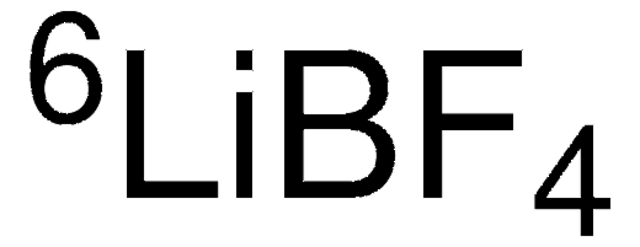901695
Lithium tetrafluoroborate
≥98%, acid <200 ppm, anhydrous
Synonym(s):
Lithium borofluoride, Lithium fluoroborate
About This Item
Recommended Products
grade
anhydrous
Assay
≥98%
form
powder
mp
293-300 °C (dec.) (lit.)
application(s)
battery manufacturing
SMILES string
[Li+].F[B-](F)(F)F
InChI
1S/BF4.Li/c2-1(3,4)5;/q-1;+1
InChI key
UFXJWFBILHTTET-UHFFFAOYSA-N
Looking for similar products? Visit Product Comparison Guide
General description
Application
Caution
- These electrolyte solutions have extremely low water content; Please handle under inert and moisture free environment (glove box).
- Keep away from heat, sparks and flame. Avoid moisture, strong acid, strong alkalis, and oxidizing agents. Avoid skin and eye contact from product. Highly toxic and corrosive gases (HF) are generated by reaction with moisture os use only under inert gas atmosphere.
- Please handle under inert and moisture free environment.
Storage:
Keep containers away from heat, humidity, direct sunlight and ignition source. Keep containers tightly closed in a cool dry and well-ventilated place. Do not store with strong oxidizing agents.
Legal Information
related product
Signal Word
Danger
Hazard Statements
Precautionary Statements
Hazard Classifications
Acute Tox. 4 Oral - Eye Dam. 1 - Muta. 2 - Skin Corr. 1B
Storage Class Code
8B - Non-combustible corrosive hazardous materials
WGK
WGK 3
Flash Point(F)
Not applicable
Flash Point(C)
Not applicable
Certificates of Analysis (COA)
Search for Certificates of Analysis (COA) by entering the products Lot/Batch Number. Lot and Batch Numbers can be found on a product’s label following the words ‘Lot’ or ‘Batch’.
Already Own This Product?
Find documentation for the products that you have recently purchased in the Document Library.
Customers Also Viewed
Our team of scientists has experience in all areas of research including Life Science, Material Science, Chemical Synthesis, Chromatography, Analytical and many others.
Contact Technical Service

















